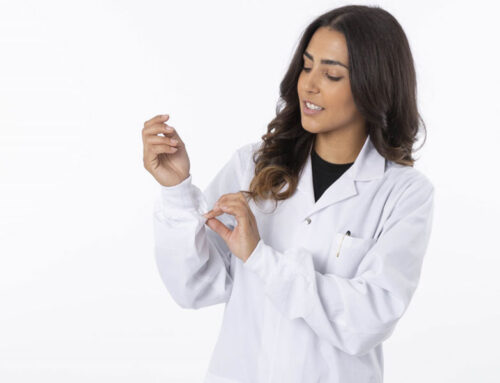
When Not to Wear White Medical Lab Coats?
Ideally, you must wear a lab coat the entire time you are in a laboratory surrounded by harmful and hazardous components, or if you are diagnosing patients in OPD.
When to wear lab coats?
The medical coat must fit you well and should be made from protective materials according to your place of work and environment. If you work in a lab with chemicals of high potency, then you must invest in a highly flame-proof lab coat. Similarly, surgeons must keep wearing their coats during the entire duration of surgery, including other PPE materials.
There are some professions where you can wear disposable lab coats to reduce the chances of cross-contamination. It can involve diseases or chemicals whose effect is too strong and, therefore, must be removed immediately.
Similarly, if there is a spillage in the lab, you must immediately remove your lab coat. It is also advisable to remove the clothes that could have been impacted and proceed to an emergency shower. It helps eliminate any harmful chemicals present on your skin before it can do any further damage.
If there is a fire in the lab or the hospital, a fire-resistant lab coat will protect you from getting any burns. Then you can proceed to a safer zone and remove your coat to help someone else impacted by the fire.
Even if you think you did not get any burns, seek emergency medical attention and take an emergency shower to ensure your protection against any after-effects of the fire.
When not to wear a lab coat?
Avoid wearing your lab coat or other PPE materials when leaving the lab or other workplace. Ensure you wash your hands or any exposed part of the skin before leaving the lab. If you are wearing a disposable coat, make sure to take it off and dispose of it before stepping outside.
Moreover, avoid wearing a lab coat or gloves when operating in a tissue culture. It is important to spray it with ethanol before putting it back on.
Who can and cannot wear a hospital lab coat?
Scientists were the first professionals to wear lab coats and introduced them in the medical field. Other professionals followed the pursuit, given the advantages of it. The following medical professionals typically wear white hospital lab coats:
- Chemists
- Microbiologists
- Research scientists
- Pharmacists
- Doctors
- Nurses
- Surgeons
- Lab technicians
- Veterinarians
- Electronic technicians
- Dentists
- Other medical practitioners
All these professionals have to wear lab coats because of the environment in which they work. Meanwhile, psychologists, psychiatrists, and other mental health professionals may not wear lab coats because they do not expose themselves to chemicals or hazards during the job.
Some healthcare professionals may wear scrubs underneath the lab coat as an added layer of protection. In other cases, lab coats are mandated by their employers or in their work facility or because their profession requires it. It also adds a sense of sophistication and seriousness to their profession. A well-dressed and easily recognizable healthcare worker makes them approachable and shows that they take their work seriously, unlike an ill-dressed professional who may pose a non-serious attitude.
What to consider when buying a lab coat?
You must consider your particular profession and the material of the lab coat before making a purchase decision. A lab coat containing 80% polyester and 20% cotton makes it fluid resistant, breathable and comfortable. You can wear it when working with acids and liquids.
We have a detailed article about materials being used in manufacturing lab coats being their significance. Meanwhile, a lab coat with 65% polyester and 35% cotton is best for chemical research lab settings and makes it fire-resistant. The more polyester the lab coat contains, the safer it becomes against hazards.
On the other hand, the added percentage of cotton makes it more breathable and comfortable. Therefore, if you work in a hospital but not in a hazardous setting, you can consider wearing a cotton coat. North Star and Fashion Seal are some examples of manufacturers of lab coats that use cotton and polyester in their coats. They are ideal for professionals who work with general chemical, biological or radioisotopes.
Other fabric materials include Shieldtec (FR/CP), and its vendors include Cintas, Fisher Scientific, Workrite, etc. They produce flame and chemical-resistant lab coats that are comfortable to wear and breathable.
Similarly, there is the Nomax and FR-treated cotton material that is also flame and chemical resistant and produced by the same manufacturers. They are ideal for welding workers who work with arc flash and deal with highly flammable materials. Cintas, North Star and Bulwark produce lab coats containing Nomax, whereas White Knight offers FR-treated cotton lab coats.
Cloth Material
You must consider your particular profession and the material of the lab coat before making a purchase decision. A lab coat containing 80% polyester and 20% cotton makes it fluid resistant, breathable and comfortable. You can wear it when working with acids and liquids.
Meanwhile, a lab coat with 65% polyester and 35% cotton is best for chemical research lab settings and makes it fire-resistant. The more polyester the lab coat contains, the safer it becomes against hazards. On the other hand, the added percentage of cotton makes it more breathable and comfortable. Therefore, if you work in a hospital but not in a hazardous setting, you can consider wearing a cotton coat. North Star and Fashion Seal are some examples of manufacturers of lab coats that use cotton and polyester in their coats. They are ideal for professionals who work with general chemical, biological or radioisotopes.
Other fabric materials include Shieldtec (FR/CP), and its vendors include Cintas, Fisher Scientific, Workrite, etc. They produce flame and chemical-resistant lab coats that are comfortable to wear and breathable.
Similarly, there is the Nomax and FR-treated cotton material that is also flame and chemical resistant and produced by the same manufacturers. They are ideal for welding workers who work with arc flash and deal with highly flammable materials. Cintas, North Star and Bulwark produce lab coats containing Nomax, whereas White Knight offers FR-treated cotton lab coats.
If you fear high contamination risk, you must use a lab coat with reusable fluid-resistant materials. Although they are not flame resistant, they provide protection against chemical contamination, and their permeable material makes them breathable and comfortable.
The Right Fit
Apart from the material, you must also consider getting a lab coat with the right fit. Ideally, it should have fitted, gathered or knitted sleeves to prevent wrist exposure and possible contamination.
Moreover, it should have a front closure from top to bottom to make it easier to take off in case of a flame or fire.
Color also plays a vital role in the selection of your lab coat. Unless your workplace or profession specifies a particular color, choose a color that identifies you easily, corresponds with your work environment and personality, and matches your position or profession.
Lab Coat Laundry
For safety and prevention, you cannot use your local laundry services to clean your reusable lab coat unless the facility specializes in lab coat laundry services. North Star and Cintas Labs provide lab coat laundry services in addition to providing them. You can rent or buy lab coats in various materials and place orders for custom sizes and repairs. You can find their centralized service areas or individual labs all across the US to avail complete services in lab coats and their maintenance.
For optimal laundry and decontamination, make sure to specify the kind of exposure the lab coat had for specific treatment. They also provide storage and pick-up services to make it easier.
ImageFirst is another specialized laundry service, particularly for the healthcare sector and medical professionals. They specialize in infection prevention and are an HLAC-accredited facility in the US.
Sign up with your email and always get notifed of BestProUniforms latest news!







